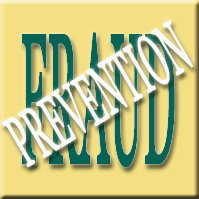
• Home •
Victim´s Story •
Fraud Prevention •
Project GSO •
Hall of Shame •
LINKS •

Prevention V: 9 Tips to Protect Yourself from Mortgage Fraud
Fraud Prevention
Tips to Protect Yourself from Mortgage Fraud at Closing:
1) Start on the right foot. Make sure the name on your application matches the name on your primary form of identification. The notarization at the closing table may be delayed, and possibly denied, if these names don't match.
2) Know and understand the terms of your mortgage. Bring all your loan information with you to the closing so that you can compare the list of loan terms, the loan type and the interest rate information on the documents with the loan terms that you agreed to when the documents were drawn.
3) Be prepared. Don't assume that your lender has captured all of your personal information accurately. Check your application information against the final loan documents to ensure that the information is correct and complete.
4) Never sign any loan documents that contain blanks. The documents should not be notarized if there are blanks. Blanks in your document make you vulnerable to fraud.
5) Know your right of rescission period and if it applies to your loan. If you have a rescission period you will have three days in which to cancel the deal. Understand that if you exercise your right to rescind, there may be other risks you hadn't anticipated, like losing your locked in mortgage rate.
6) Know what you're signing. The Notary's role is to be an impartial, third-party witness. Notaries know very little about the contents of your loan package and will not be able to answer questions related to the specifics of your loan. If you have any concerns about your loan, these should be clarified with your loan officer before you sign your documents.
7) Make sure that you and your Notary are in the same room at the same time when the document is being signed. You must appear in person in front of a Notary to have your signature notarized, even if the documents have been exchanged electronically throughout the process.
8) Work only with a Notary who can communicate directly with you in your own language. Do not depend on an interpreter who may have a motive for misrepresenting the document. Ask for a bilingual Notary if you speak a language other than English.
9) Use a professional Notary who has been trained by the National Notary Association and keeps current on important developments in fraud prevention and detection through NNA membership. It is risky to rely on an untrained Notary.
© 2006-2011 by GSO • Contact